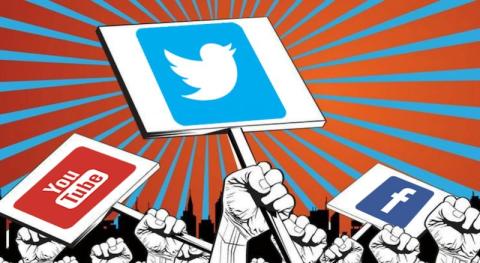Year after year, the partisan divide grows, leading political analysts to ponder the exact causes and the best way forward. This much is clear: Popular opinion has steadily veered to the margins of the political spectrum, and our candidates now cater to the more extreme voting blocs.
But perhaps the real question we should be asking pertains to how this state of affairs emerged. What factors contribute to our emerging political extremism? Social media, for one, appears to be a lynchpin in this troubling new trend.
Indeed, the polarization seems to correlate directly with the rise and spread of free, accessible social media platforms.
So, can access to public, anonymous forums for free speech facilitate our political demise? For now, the answer appears to be yes. Here’s why.
Creation of an Echo Chamber
Sites like Reddit have a self-filtering voting feature. In addition to allowing users — most of whom can remain safely anonymous behind their usernames — the ability to post anything on their mind, the site filters out those replies most contrary to public opinion.
For instance, if someone writes a post criticizing the Trump administration, and another user attempts to defend it, there is a high likelihood the second user will be downvoted into oblivion, effectively eliminating any counterargument to the original post.
YouTube includes a similar feature, as do many other sites.
While the tool seems relatively innocuous, the implications of removing opinions that contradict one's ideology have terrible long-term consequences.
With little room for intellectual debate amidst all the downvotes, more and more readers veer in one political direction or the other.
Further, the echo chamber does not allow relatively unbiased readers a chance to decide on an issue for themselves. While social media should never be the preferred medium for political debate and issue awareness, many younger voters lean heavily on such sites for their daily news.
At least 67% of college students use Facebook, which is one of the sites that has been most heavily criticized for filter bubbling users with its advertising and ability to tailor which posts you see most frequently to what aligns best with your beliefs.
How will these young minds grow and learn if no one is challenging their opinions?
Posting Anonymously
Incognito posting does have some benefits. It allows readers to absorb and judge alternate views without any associated names or ethnicities impacting their assumptions. Plus, posters can write what they genuinely believe without fearing prejudice or persecution in the workplace or social spheres.
What, then, is the problem?
With the advent of anonymous — and widely unregulated — posting, trolling and other manipulative attacks on public political perceptions persist. Slander targeting key figures in each political party goes entirely unpunished. Mistruths and distortions of reality regularly appear on biased media outlets under anonymous names.
The 2016 election, as a major example, saw a monumental Russian invasion of troll accounts on social media platforms, all publishing content intended to stir political division.
Further, anonymity has granted personal users the ability to attack the opinions of one another publicly. Removing the social consequences of blatant personal attacks and name-calling allows both to fester on public forums.
Bias Generation
And then there’s good old-fashioned media bias. Social media platforms are by-and-far laissez-faire with their users. However, in some cases, the sites will publish their own stories, many of which encourage or attack one ideological side.
These cases are relatively far and few between when considering the overall media bias which has flourished in the past decade.
Sites like Breitbart coddle the far-right and insulate their views from reality. However, certain mainstream media companies have veered left — most notably MSNBC and CNN, making it increasingly impossible to find independent news reporting.
Media bias pertains to social media, too. Users, already masked from public scrutiny, now can link to any number of extremely biased media sources when asked for evidence on outlandish claims.
Between the inability to speak face-to-face, the instant escape-hatch of logging out or deleting an account and starting a new one, and a huge ream of biased sources to validate one’s craziest claims, users can submit opinions and conspiracies as fact and face no discomfort for it.
The Rise of Social Media and Its Effects
Social media has been a mixed bag. Men and women thousands of miles apart can meet and talk about topics of mutual interest, and we have become a closer world community than ever before.
However, on issues of great division — religion, politics, etc. — social media has done very little to encourage healthy or productive debate.
